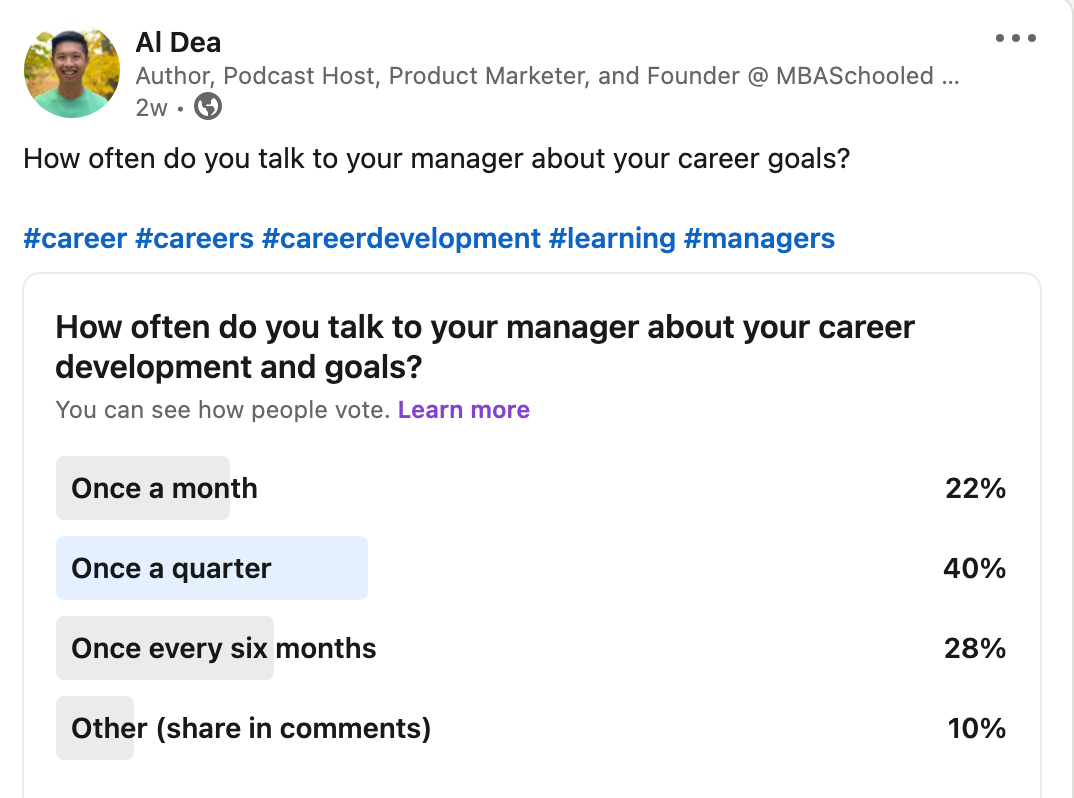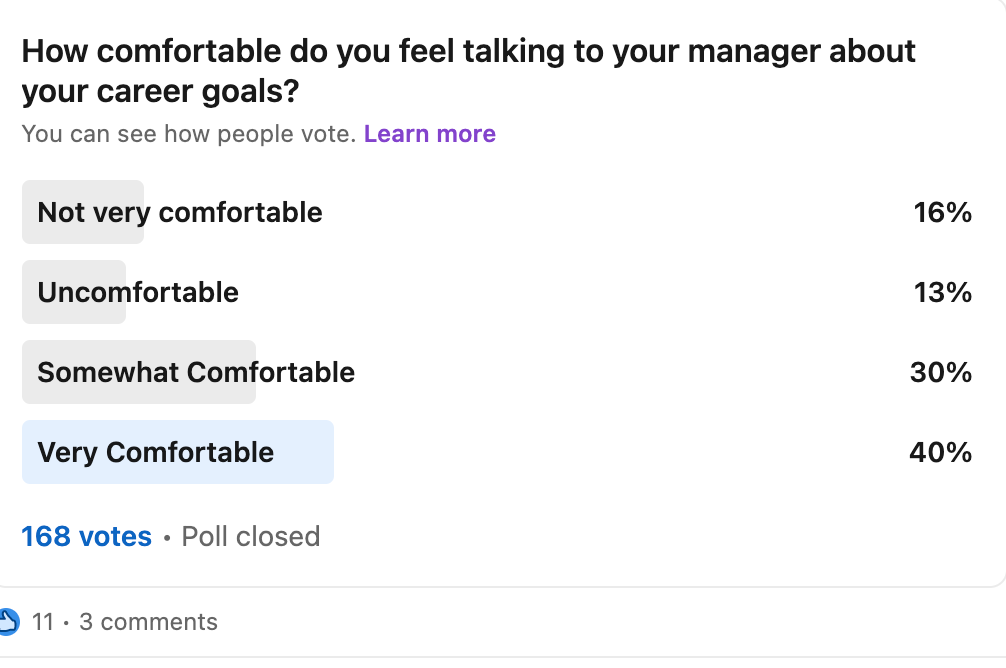Talking More Openly About Career Development in The Workplace
Some learnings from some quick research
A cool thing with LinkedIn is the polling feature. It’s been a great way to get a pulse on answers to key questions and a feeder for some of my writing topics.
Over the past few weeks, I’ve been running various polls related to career development in the workplace.
My working hypothesis is that when it comes to career development:
We’re not talking enough about it in the workplace
Leaders aren’t driving the right incentives and as a result are not seeing the right behaviors
Managers are not taking as much of a role as they could
People aren’t learning or getting coached how to A) talk about their careers and B) navigate their careers in a meaningful way
To test this hypothesis, I’ve been running various polls on LinkedIn related to career development in the workplace and trying to gain insights from the polls. I’ve been supplanting it through qualitative feedback by following up directly with people who answer or leave comments to get more granular insights. I wanted to share a few things that I find interesting.
The first poll that I asked was how often do you talk to your direct manager about career development. You can see the results below, but it looks like the majority of folks talk to their manager at least once a quarter or once every six months:
The second question that I asked was how comfortable people felt talking with their direct manager about their careers, and again, you can see the responses.
(Note: Let me acknowledge that these are by no means scientific polls, which is also why I decided to follow up with people directly to get some further insights.
And here’s what I learned:
The Good
Making Career Development a Priority - A number of people said their manager made it clear to them from the very first day that they were going to make the employee’s career development a priority. “My manager told me he believed that part of his job was to help me be successful, both in my current role but how I developed. We’d have a formal conversation about it about once a quarter, but he was open to just checking in on things informally related to my growth if I ever put time on his calendar to talk about it.”
Building Trust - But saying career development is a priority isn’t enough. The people who felt most comfortable also talked about how their managers built trust and credibility that they cared and would prioritize the employee’s career development. “I think this is part of what it means to work at a startup, but my manager made it clear to me that at some point, she would no longer be my manager, and whenever that point came, she would feel better about her job knowing that whatever I went to next, was something that I was genuinely excited by and that my manager had a role in helping me get there. This wasn’t something I was used to, but made me so much more willing to A) engage in career conversations and B) be honest about what I wanted out of my career.”
Providing Context and Clarity - Earlier on in my career, I had no idea what I wanted, but I remember I had a manager who helped me understand a bunch of options that I never would have figured out on my own, for my own limited experience and knowledge. And I think that’s what a good manager does with their employees and their careers - helps them connect the dots in ways that they might not be able to see.”
Coach not a Consultant - One mistake well-intentioned managers make is thinking that what worked for them is going to work for their people. Instead, good managers who care about career development try to act more like a coach. “My manager is really good at listening and asking questions, and then helping me see a couple paths. Previously, I had some managers who just assumed that I wanted to get promoted, or I wanted to do the same thing that they did, but my manager now is very open.
The Bad
We don’t talk about it. Ever. - One of the most common complaints was the lack of discussion around career development, full-stop. “We don’t talk about it and I don’t think anyone else on my team talks with her about it. The only time it ever comes up is during promotion season”
It’s a check the box thing - Some companies made well intentioned efforts to prioritize career development by mandating employees have some form of career development plan. Unfortunately, those go nowhere if they are exercises where people go through the motions. “We do a career development plan once a year, but nobody takes it seriously. I would say that I’ve definitely seen this to be true at places I’ve worked at and advised.”
It was focused on what the manager wanted - One other complaint was that it was something that was talked about but only when it was in the best interests of the manager. This is challenging because if an employee wants to do something that doesn’t align, then they don’t get supported. “I remember having a conversation and saying what I wanted to do more of in my current role and my manager told me that he didn’t think that would be best for my career. What I think he meant was that he didn’t agree with it. I haven’t talked to him about it again because it just left such a bad taste in my mouth.”
Lack of Trust - One of the biggest reasons conversations don’t happen is due to the lack of trust that exists between an employee and their career aspirations and the direct manager. Multiple people shared that because of the nature of their relationship with their manager, they just didn’t feel comfortable talking about it for fear of what the manager would do.
Case Study: Management Consulting Firms
One case study we have for this comes from management consulting firms. There are five unique things with consulting firms that make them great models for how to think about promoting the right mindset and behaviors around career development.
It’s a human capital business - Consulting firms don’t own products (not entirely true anymore, but suspend belief a second) - Their product is their people. They invest in their people by investing in training and learning so that their people have the knowledge, insights, and creativity to deliver good solutions to their clients. Inherent in the training and learning is making sure people have opportunities for professional development and career development. When done correctly, when people are invested in their learning and growth, that ultimately leads to better outcomes for the firm and the client
Mentorship and apprenticeship are a part of the business model - In order for the business to succeed, training and apprenticeship is critical. You can’t get someone to do something you need them to do without teaching and coaching them how to do it and do it well. Furthermore, if you are running a project, and you can mentor and coach your employees well, they will A) be able to do more work and high quality work and B) be more interested in wanting to continue to work with you
Managers need to attract top talent - Case and project teams come and go. You may work on five different cases with five different clients and with five different case/client teams. That said, many employees choose or try to choose to work with the people they like working with. As a manager, part of your job is to find people to staff on your project. If you develop a reputation for being someone who actively coaches and mentors employees, and someone who helps employees with their career development, chances are people are going to want to work with you. This helps your longer term career, but it also helps your shorter term staffing needs
Growth and Development are measured and rewarded - Managers and Partners are often evaluated and goaled on their ability to develop, coach and train younger talent. In some cases, you cannot advance to the next level unless you get approval from the leadership but also from people who are at lower levels that you have demonstrated competency, capability and interest in developing others. Leaders and managers are often also asked (and rewarded) for choosing to volunteer to lead/facilitate training and learning programs.
Some Best Practices
Leaders: Embed it in your culture and incentives - One way to get anything done within a company is to incentivize it. However, changing incentives alone is not enough. If you want managers to prioritize developing their employees and growing their careers, you also have to train and coach managers on how to do this. Most people struggle with learning how to develop and grow their own careers, trying to learn how to coach and do this for others is also difficult and often not taught.
Managers: Make it part of your role. Embrace being a coach and developer of talent. Anytime you get a new employee, bake it into the up front expectation of what you will provide for them. And take the long view - even if your people eventually leave, believe that you will benefit from the time that they are there with you if you actively develop and coach them (and who knows, you may work with them down the road)
Employees: Proactively engage your manager - Career development is employee led and manager enabled. Start by proactively making time with your manager to talk about your career development. Go out of your way to put together a plan (use one that your company provides, or find one online) and make a point of putting time on a regular cadence to talk about it.






